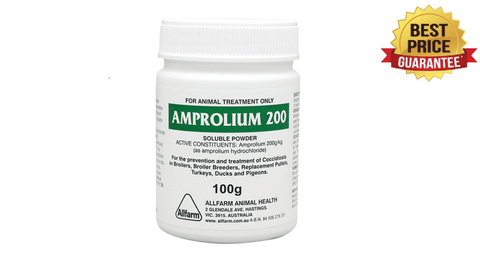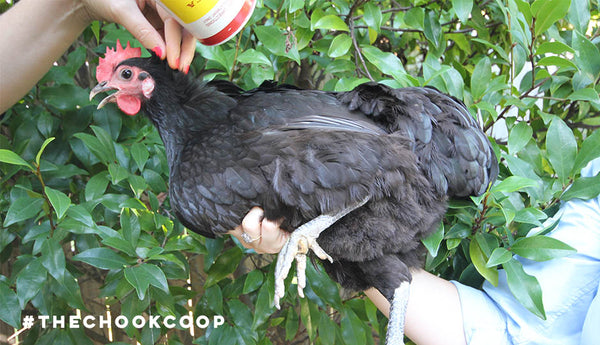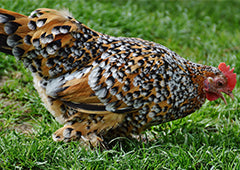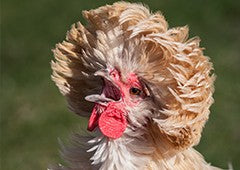Coccidiosis. It’s not just a hard word to spell and say (coke-si-di-oh-sis) but also one of the most common diseases to affect chickens and as such should be in the vocabulary of every backyard chicken keeper. Coccidiosis is prevalent among many different kinds of animals, but it’s species-specific (and if you thought ‘coccidiosis’ was hard to say, try saying ‘species-specific’ three times really fast). This means if you have livestock around with coccidiosis they won’t infect your chickens and vice versa. However, coccidiosis doesn’t discriminate amongst the avian species – ducks, turkeys, geese can all pass the disease on to chickens and vice versa.
Coccidiosis can be fatal to your chickens, however the good news is with early diagnosis it can be easily and economically treated.
We’re going to give you some tips on how you can spot coccidiosis in chickens, treat it and prevent it so you can do your best to keep your girls safe.
What is coccidiosis?

Coccidiosis is an avian intestinal disease that occurs in typically young chickens when a microscopic parasitic organism (called a protozoa) attaches itself to the intestinal lining. It damages the tissue of the gut, causing bleeding (which can be evident in their droppings), prevents the chicken from absorbing nutrients and creates an environment in which bacteria can thrive. Basically it’s bad news for chickens. Younger chickens (under six months) are more at risk as they haven’t yet had time to develop their natural immunity, however adult birds can also become affected.
All chickens carry the coccidiosis organism in their bowels but only some will develop the disease. The disease starts with an unsporulated oocyst (a very simple analogy is to think of a microscopic egg), which is passed through a chicken’s droppings. An unsporulated oocyst can lay dormant in the soil for up to a year and doesn’t sporulate (become infectious) unless it gets the opportunity to sit for several days in wet and humid conditions, for example, in and around waterers and feeders that haven’t been cleaned properly.
When a chicken eats a sporulated oocyst, either through contaminated water and food or simply during its usual scratching around in the earth, the digestive acids of the chicken’s intestines will break down the hard protective layer of the oocyst. The oocyst will hatch and invade the cell lining in the small intestine. The parasite goes through several life stages, multiplying inside the chicken and at each stage rupturing more cells within the bowel, resulting in ulceration.
The coccidia oocyst will be expelled in the chicken’s poop and can then go on to cause infection to your other hens if they eat it.
There are several different strains of the parasite, some are more damaging than others, but you don’t need to know which species is causing the disease to treat it. In some cases, it may be several species of the parasite working together to cause coccidiosis.
Coccidiosis Symptoms
Coccidiosis works quickly as the incubation period is only about eight days. Symptoms can present either gradually or suddenly – it’s not uncommon for a chicken to appear fine one day and very sick or even dead the next. The most common symptom you might notice is blood or mucous in the droppings. However, don’t get this confused with caecal droppings chickens shed naturally that is also brown/red in colour. While you can take an educated guess as to whether or not your chicken’s poop is indicating coccidiosis, only your vet can provide certainty by performing an analysis on dropping samples.
Also note, blood in poop is not necessarily always a symptom, so also look out for:
- Weak, listless looking chickens not moving around much
- Huddling together as if cold
- Pale comb and skin
- A loss of appetite
- Ruffled feathers
- Weight loss
- Baby chicks failing to grow
- Inconsistent egg laying – or not at all
- Diarrhoea
All these symptoms could be as a result of other diseases, so the only way to know for sure that you’re dealing with coccidiosis is to talk to your vet.

How is it spread?
Unfortunately it’s easily spread. The oocyst can be transmitted via shoes, shovels, contaminated water, food and poop.
Healthy chickens will build up a natural immunity to coccidiosis if they’re exposed to low levels of it over time. However, they’ll only build up an immunity to the particular strain they’re exposed to. For example, if they wander off into your neighbour’s yard for a gossip with the hens over there, in their social dig around in next door’s dirt they may ingest a sporulated oocyst of a different strain. They are at risk of becoming sick from that strain, even if they’ve already had coccidiosis and survived it once before. If there are other underlying health issues with your chickens they won’t necessarily build up their immunity and you may see repeated cases of coccidiosis. If you’re seeing repeat cases of coccidiosis ask yourself why – perhaps your chickens have some other ailment that needs to be looked at.
So how do you keep it under control? Well, we don’t suggest keeping your chickens under lock and key. After all these are microscopic parasites that all chickens will be exposed to throughout their life. With any disease the best treatment is taking some common sense measures to prevent the outbreak before it occurs.
Coccidiosis Prevention

We recommend Amprolium.

Freezing temperatures will kill coccidiosis, which is good news if you are coming into winter or live in a cold climate. However, in many parts of Australia our winter is very mild and the warm, humid, and wet conditions coccidiosis need to thrive are still in play. Basic hygiene is your first step for prevention – make sure your coops are clean and dry. Also:
- Ensure water is clean and fresh
- Keep feeding areas clean and dry and don’t throw food on the ground where it can be contaminated
- Ensure your girls have enough space – coccidiosis will take off in an overcrowded area. Chickens need four square feet of space each in their coops
- Provide medicated starter feed for chicks. If your chicks have been vaccinated against coccidiosis, don’t give them medicated starter feed, it will simply cancel out their vaccination.
- If you live in a particularly wet area consider giving amprolium as a preventative. You can buy it over the counter from vets, produce stores or pet stores.
- If introducing new members to your team of chickens, keep them quarantined for a minimum of two weeks, for the protection of everyone in the hen house.
If you’re buying day-old vaccinated chicks in Australia they’re more likely to be vaccinated against Marek’s disease and/or Newcastle disease as well as respiratory infections than coccidiosis. Vaccines only introduce a strain of the infection – given there are several hundreds of strains your chicks are likely to be exposed to a different strain in your environment and will be at risk anyway. Check with your hatchery as to what kind of vaccinations they provide – in Australia vaccination generally only takes place on a large-scale commercial level. Medicated starter feed is probably your better option in this case.
Coccidiosis Treatment
All for one and one for all! If one of your girls has coccidiosis your whole flock must be treated. Isolate your sick hens from the rest of the flock and immediately make sure you clean out their coop, checking to ensure their living space and feeding areas are clean and dry.
You’ll need a commercial treatment to block the ability of the parasite to uptake and multiply. Amprolium is commonly used – it’s a liquid that is administered by adding it to the hens’ water supply. However, if your hens are quite sick they may need to take it orally as it’s likely they’re not drinking enough to take in the treatment. Amprolium is available over the counter, but if you have concerns contact your vet for professional advice about how to medicate your flock. It’s likely you’ll have to keep treatment up for about seven days. If the environment that your chickens are kept in is wet, humid, and warm you may need a second dose of treatment to ensure it’s completely eradicated.
Amprolium interferes with the coccidia oocyst’s ability to metabolise vitamin B so you may need to provide your chickens with a vitamin B supplement following treatment – but don’t give them this during treatment as you might render it ineffective.
Amprolium is said to have zero egg withdrawal time, however if your hens are still laying while they’re on medication it’s best to chat to the expert – your vet – about whether or not the eggs will be safe to eat. Egg production is related to how healthy your birds are – so chickens with coccidiosis will generally stop or reduce laying eggs and only start again once treatment is finished and they’re feeling healthy again.
Growing chickens that have chronic coccidiosis can develop intestinal fibrosis (scarring) that can result in the inability to absorb nutrients effectively. These hens are unlikely to ever be adequate egg layers.
Summary
We don’t mean to scare you but coccidiosis, while treatable, can be serious for your birds. The best way to manage it is to avoid it by being a vigilant pet owner and keeping on top hygiene practices. Remember:
- Coccidia oocyst need wet, warm, and humid conditions to thrive. Keep feeding and watering areas clean and clean out litter and droppings from coops regularly
- Coccidiosis will spread fast in overcrowded conditions - give chickens at least four square feet of space each
- Incubation is about eight days and symptoms can appear gradually or quickly. Keep an eye on your ladies for anything out of the ordinary
- Blood in droppings, listless birds, loss of appetite – if you see any of these warning signs the sooner you act the more chance your chickens have of survival
- Younger birds are more at risk – consider providing medicated starter feed for chicks
- Amprolium is the normal treatment, but you can also use it as a preventative
- Caught early it is treatable. Talk to your vet about the appropriate medication.

As chicken keepers, we like to think that we are doing the best we can for our girls, however, there is often more we can do to prevent health issues. I recommend the Ultimate Chicken Online Health Course to all my readers! It is written by our friends over at Chickenpedia. They have compiled everything you need to keep healthy chickens through the seasons (which is more than you think!) with a great set of check-lists and downloads to keep.
Many thanks to Dr Adrian Gallagher at Brisbane Bird Vet for his advice on this article.
Comment below your experience with treating coccidiosis and share your tips and feedback for others to read.

















